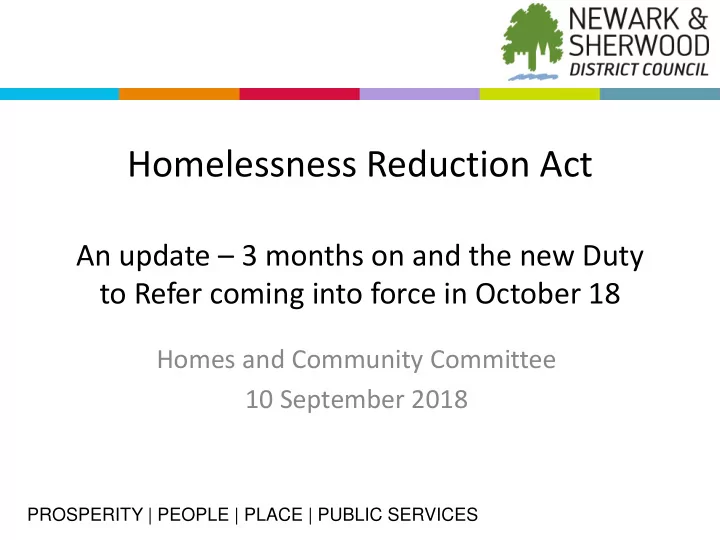

Homelessness Reduction Act An update – 3 months on and the new Duty to Refer coming into force in October 18 Homes and Community Committee 10 September 2018 PROSPERITY | PEOPLE | PLACE | PUBLIC SERVICES
Background • Homelessness Reduction Act 2017 (HRAct) – went live April 2018 • Reminder of the 12 main changes: 1. definition of homeless or threatened with homelessness extended to 56 days; 2. Extension and strengthening of duty to provide advisory services; 3. Duty to assess all eligible applicants and agree a plan; 4. New duties in cases of threatened homelessness; 5. 56 day relief duty with ongoing support; 6. Increased duties to take reasonable steps to secure accommodation for all eligible households; 7. Introduced deliberate and unreasonable refusal to cooperate for applicants not engaging; 8. Amended local connection for care leavers; 9. Amended and increased right to review (section 202); 10. Will bring in new duty to refer for identified public bodies (October 2018); 11. New power for the secretary of state to issue statutory codes of practice; 12. Amended Article 3 (Suitability of Accommodation) placing increased assessment duties on the local authority.
Implementing significant change Implementing the HRAct has involved: • Developing new pathways ; • Operating a new computer recording system ; • Changes to performance monitoring – H-Clic; • Increased volume of work and caseload; • Increased pressure for staff; • Increased Temporary Accommodation usage - resulting in B&B being required for the first time in 18 years.
How do we compare? MHCLG have received local authority data for quarter one but are yet to release any data for comparison. Consistent with national and county trends and changes – * all have an increase in presentations for assistance; * all have more households in temporary accommodation ; * all are experiencing increased lengths of stay , some due to the 56 day relief duty and others due to not having suitable offers of alternative accommodation; * those who previously had high numbers of households in temporary accommodation are having to resort to B&B and backup placements.
Duty to Refer • The HRAct places a new duty to refer on specified public bodies from 1 October 2018 • Public Bodies (contained within the Code of Guidance 2018) • Prisons (public and private); • Youth offender institutions; • Secure training centres; • Secure colleges; • Youth offending teams; • Probation services (community rehabilitation companies and national probation service); • Jobcentre Plus; • Accident and emergency services provided in a hospital; • Urgent treatment centres1; • Hospitals in their capacity of providing in-patient treatment2; and • Social service authorities. • The Secretary of State for Defence is also subject to the duty to refer in relation to members of the regular forces. • Consent will be required from each individual that agrees to a referral by the public body • It is the individuals choice on which LA they would like to be referred to
Housing Jigsaw - ALERT Newark and Sherwood will be using Housing Jigsaw ALERT to facilitate the duty to refer by specified public bodies. Initial focus - referrals under s213b (from specified public bodies) as well as referrals from wider partner agencies. Preparation for Go Live in October: • Consistency - 150 authorities have already signed up • ALERT pilot wef 13.08.18 • Access through website • Preferred method of referral • Partner training sessions jointly within County • Development on Housing Jigsaw ALERT will continue through the summer to include wider referrals and notifications
Next Steps • Continue to monitor the impact of HRA, demands on the service, challenges and risks compile report on first six months; • Continue to maximise prevention and relief ; • Aim to minimise the use of temporary accommodation especially B&B; • Monitor lengths of stay in temporary accommodation and maximise move on; • Continue with systems development ; • Pilot ALERT with county partners; • Train staff in the use of ALERT; • Train partner agencies and commissioned services, especially statutory bodies in the ‘duty to refer’ and using the ALERT referral mechanism . • Engage MHCLG Homelessness Advice and Support Team(HAST).
Recommend
More recommend